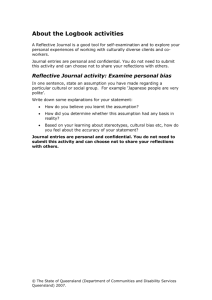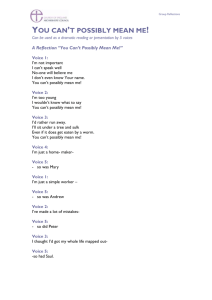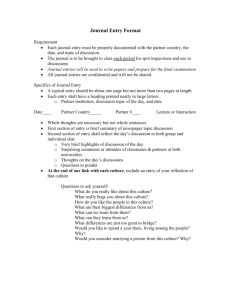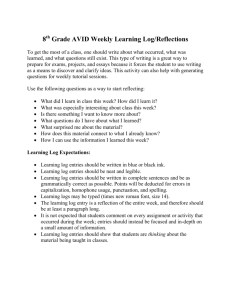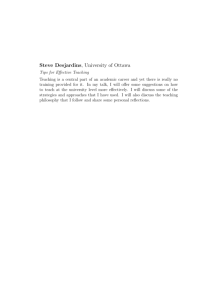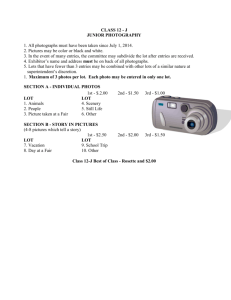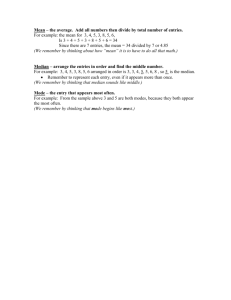50 tips - Andrew Gibbons
advertisement
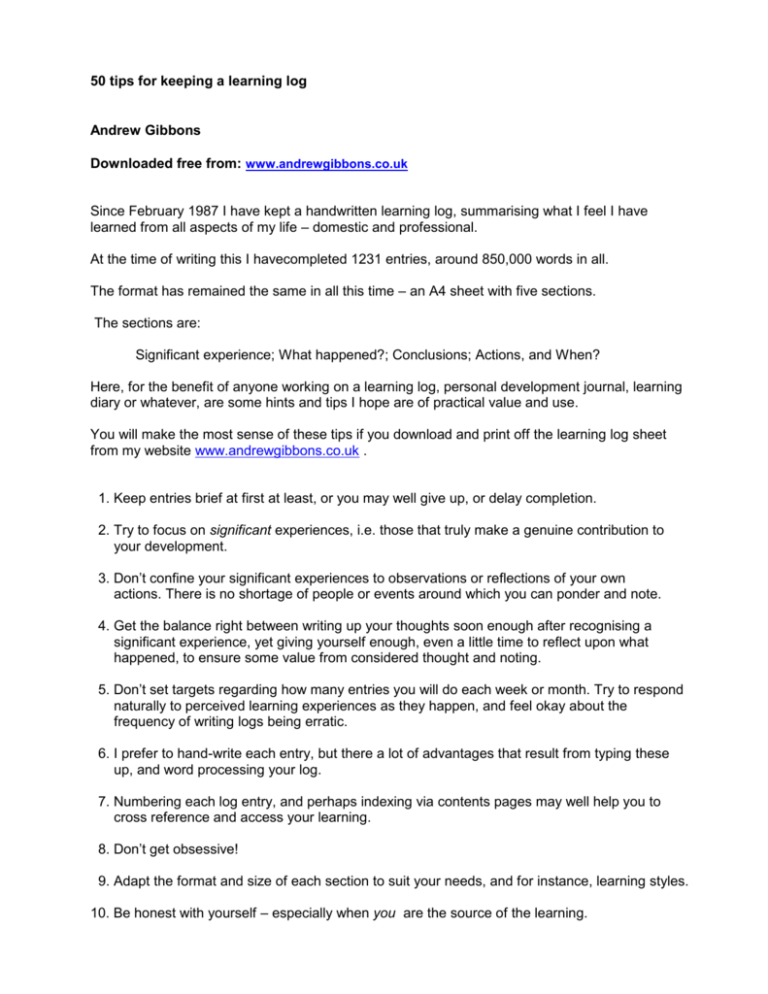
50 tips for keeping a learning log Andrew Gibbons Downloaded free from: www.andrewgibbons.co.uk Since February 1987 I have kept a handwritten learning log, summarising what I feel I have learned from all aspects of my life – domestic and professional. At the time of writing this I havecompleted 1231 entries, around 850,000 words in all. The format has remained the same in all this time – an A4 sheet with five sections. The sections are: Significant experience; What happened?; Conclusions; Actions, and When? Here, for the benefit of anyone working on a learning log, personal development journal, learning diary or whatever, are some hints and tips I hope are of practical value and use. You will make the most sense of these tips if you download and print off the learning log sheet from my website www.andrewgibbons.co.uk . 1. Keep entries brief at first at least, or you may well give up, or delay completion. 2. Try to focus on significant experiences, i.e. those that truly make a genuine contribution to your development. 3. Don’t confine your significant experiences to observations or reflections of your own actions. There is no shortage of people or events around which you can ponder and note. 4. Get the balance right between writing up your thoughts soon enough after recognising a significant experience, yet giving yourself enough, even a little time to reflect upon what happened, to ensure some value from considered thought and noting. 5. Don’t set targets regarding how many entries you will do each week or month. Try to respond naturally to perceived learning experiences as they happen, and feel okay about the frequency of writing logs being erratic. 6. I prefer to hand-write each entry, but there a lot of advantages that result from typing these up, and word processing your log. 7. Numbering each log entry, and perhaps indexing via contents pages may well help you to cross reference and access your learning. 8. Don’t get obsessive! 9. Adapt the format and size of each section to suit your needs, and for instance, learning styles. 10. Be honest with yourself – especially when you are the source of the learning. 11. Take a copy of each sheet, and keep it safe – as your log grows, and increases in value, you may even want to keep the copy in another place…in case your house burns down! 12. You might find it helps to note a significant experience on a post it for a day or two to ensure the issue/s you will write up after some reflection, in order no to lose the idea. 13. Don’t expect positive results instantly – It took me months of effort before benefits were felt. 14. Entries don’t all have to be retrospective…’what happened?’ could for instance start…’I have been thinking about/planning for, whatever. 15. All my conclusions start with the word ‘that’, and I find this is an excellent word to prompt genuine conclusions, and not waffle, or for instance, a continuation of ‘what happened?’. 16. Don’t worry too much about spelling or grammar, just get it down, as you feel about it before it goes. 17. I find I often write the significant experience line last, as I really don’t know exactly what I will write until I get going, so do this last to reflect the true content of the entry. 18. Make certain your ‘actions’ are reasonable and attainable – don’t set yourself impossible targets. 19. Actions can be retrospective – i.e. what you recognise you have done, not necessarily what you will do in the future. 20. Consciously seek and find time to reflect upon recent or past experiences with learning potential. I for instance, deliberately leave the radio off in the car sometimes to think about my learning. Time can be found for this if we take our development seriously. 21. Try to complete each entry in one attempt – don’t do a few or many, words then put it to one side, or you will lose the flow. I found I could write with fluency quite early on, and that even complex issues could be summarised and learning extracted in twenty minutes of writing. 22. Avoid the temptation to edit, add to, or delete thoughts – after all you thought those things, and they have value, and so what if you didn’t note the perfect summary of whatever it was. This is another reason why I have maintained an entirely hand-written log. 23. Try to find someone who has enough interest in your development that they will spend some time with you to go through what you have logged, and push you on what you have really learned, and crucially, what you have done as a result of your reflections and plans. 24. Review your action points at regular intervals. Are you actually doing what you said you should? Identify blockages to implementing your learning, and plan to overcome these. 25. Recognise that the value of each individual entry is incremental, and not in themselves of great significance, and that collectively, and over an extended period your log will become a volume of very considerable importance. 26. Don’t worry if you miss out on writing up a learning experience – it’s inevitable, and the more analytical you become, the more aware you will be of the scope for reflection on your development, and of incidents or thoughts that go unwritten. 27. It’s too much to expect entries to be entirely complete, or as articulate a description of what you are thinking – just getting a decent account of your reflections should be celebrated. 28. Recognise that some entries will need more or less words than others – it’s not necessary to fill each entry with words. 29. Be prepared for some knocking. Many who show a lot less commitment to their own development will have a dig at your efforts – you don’t need to justify your logging to people who don’t, and never will, share your desire to manage your own development. 30. If you show your reflections to others, who may have inspired them, don’t be put out by an unfavourable reaction, or to a challenge to the way you saw events. You have a right to your opinion, however different to those of others. 31. It is crucial that you don’t dodge when actions prompted by your conclusions will be actioned. Here’s a thought worth pondering – the when doesn’t have to be time or date-specific, it may make more sense to think of a situational ‘next time I do this’ type action note. 32. Don’t worry about feeling you are repeating your reflections, or covering familiar ground, to log familiar issues is both natural, and a good way of reinforcing your leaning. 33. Some people will feel you are doing no more than merely writing down common sense stuff, but don’t let this bother you – as you take your learning seriously you will see clearly that we do indeed learn at least something new every day – but, without noting this, will we ever know what it was exactly? 34. Try not to get too dependent on your log to the exclusion of other sources of development. Other forms of learning may not be as needs-specific, or personally driven, but they can still have their merits. 35. If you feel it is of value, supplement your log with other items that contribute to your development. Learning log sheets alone may not tell the whole story. 36. Be prepared to consciously exclude reflections upon issues that you would rather not ponder upon. It took me years to feel okay about noting, and seeking to learn from the less pleasant experiences in my life. Your log should be a positive, not a harmful force in your life. 37. I have found that asking questions helps to focus my thoughts developmentally…for instance, ‘why do we interrupt?’ or ‘from whom can I learn more about…well just about everything!’. 38. Don’t let your log become no more than a diary – it should always be a prompt to take actions that result directly from what you consider to be developmental experiences and reflections. 39. Be as specific as possible with the actions you intend to take as a result of your conclusions, as this makes implementation more likely. 40. I find that numbering each action to be taken, and then numbering similarly the ‘when’ entries links actions to be taken with the detail of implementation. 41. Don’t over rehearse or prepare an entry – you may well lose spontaneity. 42. Feel good about keeping a log of your learning. It takes considerable commitment and discipline, so allow yourself a pat on the back. 43. Be careful not to generalise wildly on the basis of single experiences or events. Mind you don’t make premature assumptions ahead of considered analysis. 44. Look back over your reflections from time to time, and get a feel for how you are developing. 45. Make certain you apply your learning by reviewing your planned actions in particular – unless you do things you wouldn’t have without logging your learning, it is no more than a record of thoughts and plans – useful, but not as much as if your actions are actioned. 46. I find myself overflowing my conclusions into the ‘what happened?’ section, as this puts emphasis on my reflection, and cuts down the summary of whatever happened to prompt the entry. This fits with my deliberate effort to be more reflective – for someone who wants to develop their ability to instigate learning experiences the reverse may be sensible. 47. Most of my entries are focused upon one principal issue, but sometimes I find myself noting my learning, and planning its use around two, three or more issues. 48. If you have lapsed for a time, don’t fret, it may help to make a short entry just to get yourself back into the swing of it all again. 49. It might help to keep a blank log sheet with you most times…it would be a shame to miss out on a prime opportunity to reflect upon and note your learning just because you didn’t have a log sheet around when you needed one. 50. It seems an obvious point, but do look after your learning log. I keep all my ‘originals’ in plastic pockets, in three lever arch files…mind you when I started they took a long time to begin to fill any sort of file! I hope this helps – do contact me if I can be of any further assistance. Good luck with your learning logging! Downloaded free from: www.andrewgibbons.co.uk
